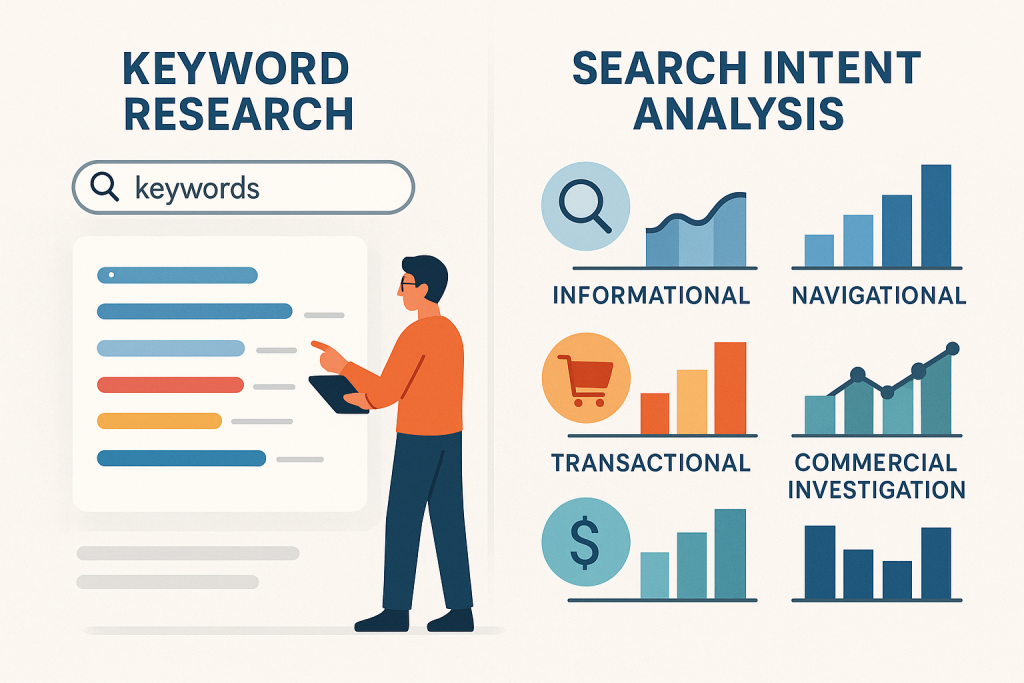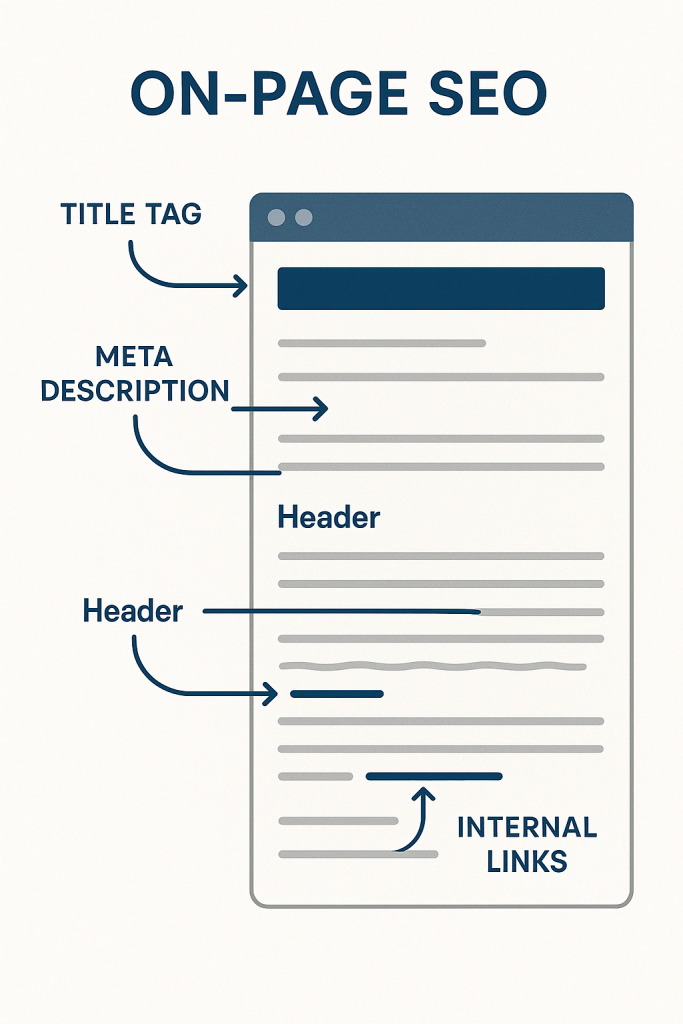Credit repair businesses face a tough challenge. You need to find people who need help fixing their credit scores, but these people don’t always know where to look for help. This is where SEO for credit repair lead generation becomes your best friend. When someone types “how to fix my credit score” into Google at 2 AM, you want your business to show up first.
SEO isn’t just about getting more website visitors. It’s about getting the right visitors who are ready to pay for credit repair services. These people are actively searching for solutions, which means they’re much more likely to become paying customers than someone who just saw your Facebook ad. The best part? Once you rank well in Google, you keep getting leads without paying for each click, like you do with ads.
People searching for credit repair help are usually in one of three stages. First, they might just realize they have a credit problem. They search for things like “why is my credit score low” or “what affects credit scores.” These people need education before they’re ready to buy.
Second stage searchers know they need help and are looking for solutions. They type “how to remove collections from the credit report” or “credit repair companies near me.” These folks are getting closer to making a purchase decision.
The third group is ready to buy. They search for “best credit repair service” or “credit repair reviews.” These are your hottest leads because they’re comparing options and ready to sign up.
Credit repair SEO strategy works best when you create content for all three stages. Use Google Search Console to see what people actually search for when they find your site. AnswerThePublic shows you questions people ask about credit repair. Keyword planning tools help you find search terms that aren’t too competitive but still get decent traffic.

Think of your website like a library. Instead of having random articles scattered everywhere, you want organized sections that cover related topics thoroughly. Start with your main topic: “credit repair lead generation.” This becomes your pillar page that covers the topic broadly.
From there, create clusters of related content. You might have pages about “credit repair lead magnets,” “credit repair landing page optimization,” and “credit repair marketing automation.” Each cluster page should link back to your main pillar page and to other relevant cluster pages.
Here’s how your content clusters might look:
Credit Repair BasicsCredit score factors, dispute process, timelineAwarenessDIY Credit RepairTemplates, letters, step-by-step guidesConsiderationProfessional ServicesPricing, guarantees, success ratesDecision
Internal linking between these pages tells Google that your site is an authority on credit repair topics. When you link from your “how to dispute credit errors” page to your “credit repair services” page, you’re guiding both search engines and visitors through your content.
Your page titles and descriptions are like billboards for your content. They need to grab attention while including your target keywords naturally. A good title might be “Credit Repair Lead Generation: 7 Proven Strategies That Work.”
Your main heading should include your primary keyword early. Put your most important keyword in the first 100 words of your content. Don’t stuff keywords awkwardly – use them where they make sense naturally.
URL structure matters too. Instead of “/page123,” use “/credit-repair-lead-generation/” to help both users and search engines understand what your page covers.

Headers organize your content and provide more keyword opportunities:
Don’t forget about images. Every image should have descriptive alt text that includes relevant keywords when appropriate. Schema markup helps Google understand your content better and can earn you rich snippets in search results.
Your website’s technical setup determines whether search engines can properly read and rank your content. Mobile-first indexing means Google primarily uses the mobile version of your site for ranking. Since many people search for credit help on their phones, your lead capture forms must work perfectly on mobile devices.
Site speed directly affects your rankings and lead conversion rates. Slow websites lose visitors before they even see your content. Compress images, use caching, and consider a content delivery network to speed up your site.
Technical checklist for credit repair sites:
These technical elements might seem boring, but they’re the foundation everything else builds on. A technically sound website ranks better and converts more visitors into leads.
Generate credit repair leads with SEO by creating content that actually helps people while guiding them toward your services. How-to guides work well because people searching for credit repair help want step-by-step instructions.
Write articles like “How to Read Your Credit Report for Errors” or “5 Steps to Dispute Incorrect Credit Information.” These topics attract people who need credit help while positioning you as an expert.
Content formats that generate leads:
Every piece of content should include clear calls-to-action. Don’t just say “contact us.” Be specific: “Download your free dispute letter template” or “Get your personalized credit repair plan.”
Case studies and customer success stories build trust without being overly promotional. When you show real results, potential clients feel more confident about working with you.
Balance evergreen content that stays relevant with timely pieces about credit law changes or new regulations. Evergreen content continues attracting leads months or years after publication.
Other websites linking to your content signal to Google that you’re a trusted authority. Guest posting on finance blogs lets you share your expertise while earning valuable backlinks to your lead generation pages.
Look for partnership opportunities with local businesses that serve similar customers. Real estate agents, mortgage brokers, and financial advisors often encounter people who need credit repair help. They might be willing to link to helpful resources you create.
Digital PR helps you earn mentions in news articles and industry publications. When new credit laws pass or credit reporting changes happen, reach out to journalists with expert commentary. These mentions often include links back to your website.
Monitor your backlink profile regularly. Low-quality links from spammy websites can hurt your rankings. Use Google’s disavow tool to tell search engines to ignore bad links pointing to your site.
Focus on earning links from:
Many people prefer working with local credit repair companies. Local SEO helps you capture these geographically specific searches. Optimize your Google Business Profile with accurate information and regular updates.
Include location-based keywords in your content naturally. Instead of just targeting “credit repair services,” also target “credit repair services in [your city].”
Local citation building involves listing your business on relevant directories:
Customer reviews boost both your local rankings and conversion rates. People trust businesses with positive reviews more than those without any reviews. Respond to all reviews professionally, even negative ones.
SEO success requires tracking the right metrics. Don’t just look at traffic numbers – focus on metrics that indicate lead generation success.
Organic TrafficMore visitors = more potential leadsGoogle AnalyticsKeyword RankingsHigher rankings = more visibilitySEO toolsConversion RateTraffic that becomes leadsAnalytics goalsCost Per LeadSEO efficiency vs other channelsRevenue/lead data
Set up Google Analytics goals for lead generation activities. Track when people download your lead magnets, fill out contact forms, or request consultations. Use UTM codes to identify which content pieces generate the most leads.
Create SEO dashboards that show performance trends over time. Look for patterns in what content performs best and which keywords drive the most valuable traffic.
A/B testing helps optimize your pages for better conversion rates. Test different headlines, call-to-action buttons, and form placements to see what works best with your organic traffic.
For real-time A/B testing on your organic landing pages and deeper visitor behavior insights, integrate CausalFunnel’s AI-powered testing and attribution platform. Its DeepID technology unifies online and offline conversion data, so you can see which SEO pages truly drive new credit repair leads and optimize accordingly.
Regular content audits identify opportunities to improve existing pages. Update old content with new information, add internal links to newer pages, and refresh outdated statistics or examples.
Voice search optimization becomes more important as people use Siri, Alexa, and Google Assistant to find services. People ask questions differently when speaking than when typing. They might say, “How can I fix my credit score fast?” instead of typing “fast credit repair.”
Featured snippets provide valuable real estate in search results. Structure your content to answer common questions clearly and concisely. Use numbered lists, bullet points, and clear headings to increase your chances of earning these prime positions.
Video content increasingly appears in search results. Create short videos explaining credit concepts or showing how to use credit monitoring tools. Upload them to YouTube with optimized titles and descriptions that include your target keywords.
Local search optimization extends beyond basic listings. Create location-specific landing pages if you serve multiple cities. Write content about local credit challenges or regulations that affect your area.
Creating great content is only half the battle. You need to distribute it effectively to maximize its SEO impact. Share new articles on social media platforms where your target audience spends time.
Email marketing to your existing list helps drive initial traffic to new content, which can boost its search rankings. When people visit and engage with your content quickly after publication, it signals relevance to search engines.
Repurpose successful content into different formats. Turn a popular blog post into a video, infographic, or podcast episode. Each format can rank for different types of searches and attract different audience segments.
Cross-promotion between related content pieces keeps visitors on your site longer, which helps with SEO rankings. Link to relevant articles within your content and suggest related reading at the end of posts.
Many credit repair companies make costly SEO mistakes that hurt their lead generation efforts. Keyword stuffing makes content sound unnatural and can result in search engine penalties. Write for humans first, search engines second.
Neglecting mobile optimization costs you leads since many people search for credit help on their phones. Test your lead capture forms on different devices to ensure they work smoothly everywhere.
Ignoring page loading speed frustrates visitors and hurts rankings. Regularly test your site speed and fix issues that slow down your pages.
Creating thin content that doesn’t thoroughly cover topics won’t rank well or convert visitors. Each page should provide comprehensive value that fully addresses the searcher’s intent.
SEO for credit repair lead generation isn’t a quick fix – it’s a long-term strategy that builds momentum over time. Consistent content creation and optimization efforts compound to create sustainable lead generation.
Stay updated on search algorithm changes that might affect your rankings. Follow reputable SEO news sources and adjust your strategy when necessary.
Build relationships with other professionals in the finance industry. These connections can lead to natural link opportunities and referral partnerships that benefit your SEO efforts.
Document your SEO processes so you can delegate tasks and maintain consistency as your business grows. Create editorial calendars, keyword research templates, and optimization checklists.
Start with keyword research to understand what your potential clients are actually searching for. Use this data to plan your content calendar for the next three months.
Audit your current website for technical SEO issues. Fix any problems that prevent search engines from properly crawling and indexing your content.
Create a content calendar that balances educational articles with lead-generation-focused pages. Plan to publish consistently rather than in sporadic bursts.
Set up proper tracking and measurement systems before you start creating new content. You need baseline data to measure improvement.
The credit repair industry is competitive, but SEO gives you a sustainable advantage over companies that rely only on paid advertising. When you consistently create valuable content that ranks well in search results, you build a lead generation system that works around the clock.
Focus on helping people understand their credit situations while naturally guiding them toward your services. This approach builds trust and positions you as the obvious choice when they’re ready to hire a credit repair company.
Empowering businesses to optimize their conversion funnels with AI-driven insights and automation. Turn traffic into sales with our advanced attribution platform.



